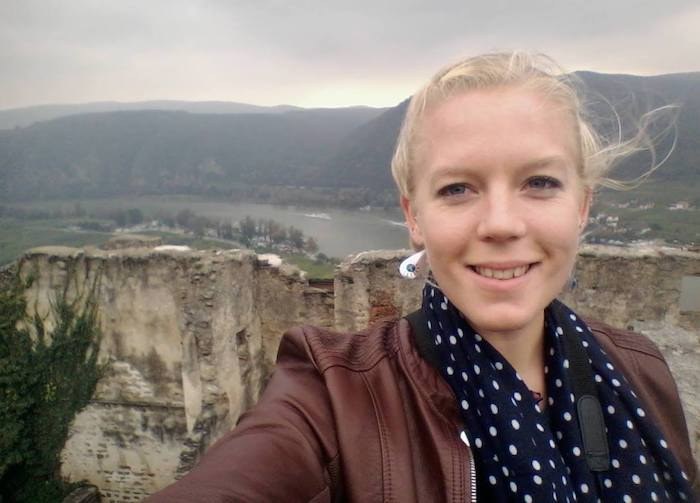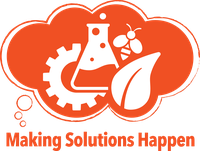Posted: May 28, 2020
New practicum offers professional development and industry experience

Kaila Thorn, a Ph.D. candidate in Agriculture and Extension Education who wants to improve the effectiveness of youth organizations, travels to learn about different cultures and new ideas. Here, she’s in Eastern Europe. Thorn enrolled in a new practicum course offering professional development this spring, and had a bonus opportunity to learn how professionals stay focused in a crisis.
Kaila Thorn, a Ph.D. candidate in Agriculture and Extension Education from Cocoa, Florida, spotted a chance to work with professionals outside of a university setting toward her vision to improve the effectiveness of youth organizations, so she signed up for a new practicum course offering in spring 2020.
When the COVID-19 pandemic upended Penn State and global life this spring, Thorn had a bonus opportunity to observe how professionals kept working through a crisis.
Thorn quickly adapted to a new reality, finished her project and came through the disruption with flying colors.
“She didn't miss a beat," said Dr. Maria Spencer, John and Patty Warehime Entrepreneur-in-Residence.
Dr. Spencer launched the pilot course in spring 2020 to provide graduate students with professional development and mentored projects that align with their goals.
Dr. Spencer spotted a need for a course for graduate students that helped boost leadership, problem-solving and critical thinking — important skills, in addition to academic and technical training.
“This course is designed to give students some practice in that area — a chance to apply their technical training with mentorship from a professional in their chosen field," said Dr. Spencer. “Students also have an opportunity to expand their professional network through mentor relationships and ties to organizations of interest."
In addition to practical experience, professional presence and communication is also important. Professional social media profiles, headshot images, resumes, cover letters, and work portfolios are all part of the course, said Dr. Spencer.
The availability of tenure-track academic positions is declining. An estimated 12.8 percent of Ph.D. graduates secure academic positions in the United States, according to an analysis published in 2014 in the journal Systems Research and Behavioral Science.
Employers often identify critical thinking and interpersonal skills as top attributes, according to a report “Ready for Jobs, Careers, and a Lifetime" from the Association of Public & Land-Grant Universities.
“Jobs increasingly call for T-shaped talent, with both deep, vertical technical expertise in a technology or set of technologies, and also broad, horizontal capacities in critical thinking and linking expertise across disciplines," noted the report.
Dr. Spencer is looking for professionals who are prepared to have strong students work side-by-side with them and contribute. Spencer also wants to assure students engage in valuable, professional experiences. The concept is to provide a higher-level collaboration experience beyond the typical internship.
“It's important to me that students don't just get a stack of administrative clerical work," said Dr. Spencer, as a trade-off for putting an organization's name on a resume.
Dr. Spencer began the course by asking students to explain what they want to do, and to describe their dream employer. Then they set about finding a good match with a company and project.
The timing turned out to be perfect for Thorn.
Thorn — who in 2017 earned a Master's in Ag and Extension Education, and began her Ph.D. studies in 2018 — is interested in youth and community development work to empower teenagers and young adults to organize for positive changes, and in the social science around that work.
She worked for 4-5 years in experiential education with young people, and saw both the benefits of hands-on experience and the challenges. She sought graduate studies to learn about ways to improve hands-on, youth programs.
The practicum, she said, offered “really valuable content and personalized feedback. You can go to big workshops where people are trained, but they don't know you so you don't get overly useful information."
Through her advisor Dr. Mark Brennan, professor and UNESCO chair in Community, Leadership and Youth Development, Thorn has worked with “Youth as Researchers" a United Nations Educational, Scientific and Cultural Organization program focused on youth organizations.
The program provides youth ages 14 to 25 with social research training that allows them to properly design projects and methodology to collect data from other young people on what they view as the most pressing social issues they face.
The key question for youth researchers to ask youth: What change do you want to see?
For the practicum course, Spencer and Thorn identified organizations and sent queries. They found a good match with the organization Funders Collaborative for Youth Organizing, which works with youth organizing groups across the country to provide support and engage with funders.
The organization shares the philosophy of UNESCO, and was in the midst of working with a consultant on a study of philanthropy funders — so was an ideal match.
Thorn's assignment: work with the consultant Seema Shah to clean up and analyze data on the people and organizations that donate to youth organizations.
And then, COVID-19 began its assault — and personal lives were relevant in new ways.
Shah, the consultant, lives with a first responder in New York City. So the pandemic quickly became quite real for her, Thorn learned.
“There were intriguing conversations and interactions with Seema, where we were able to carry on this conversation in a new light," said Thorn, who worked — virtually, of course — alongside a professional and watched her cope through a major crisis in a professional way.
“Being able to see how Seema just continued on, aware and making adjustments as needed," said Thorn. “It was nice. It was grounding. She wasn't ignoring what was happening, but recognizing what she could control. For her, that was a lot of her work, so that's what she did. We had work to do, so that's what we did."
They continued to work on data analysis and completed a draft of their report for the Funders organization.
“Now I've got more information on what that funders side of the story looks like," said Thorn. As she works with different organizations, she has more insight on how to improve them in part so that they are more attractive to funders.
“I do not think this connection would have happened without Dr. Spencer setting it up in the course framework," said Thorn.
This summer, Thorn is assisting with an international initiative with the UNESCO Youth as Researchers program. It will be entirely virtual, and run in multiple countries, all focused on the youth experience around COVID-19. Youth across the globe will be asking their peers: What ways are you impacted? What do you want to see change following the impact of COVID?
The practicum was structured to devote time both to working with an organization and to other areas of professional development – especially professional communication. Thorn and Spencer worked on converting Thorn's CV for an academic setting to a resume for a position in business, and LinkedIn profile. Mid-semester, when Thorn applied for a job, she had Spencer's help to craft a cover letter and field questions from the potential employer.
“I would not otherwise have had this breadth of experience. I can't think of another resource I could go to that would be as helpful, in the way that she could personalize it because Dr. Spencer knew me," said Thorn.
“I learned a whole slew of different things about philanthropy that I previously had no exposure to," said Thorn.
Thorn's dissertation will explore an aspect of running the Youth as Researchers program during the COVID-19 pandemic. She has finished her last full semester of coursework, is preparing to take comprehensive exams and moving on to working on her dissertation.
Dr. Spencer will teach the practicum virtually for the Fall 2020 semester.
Social Media

Social Media


